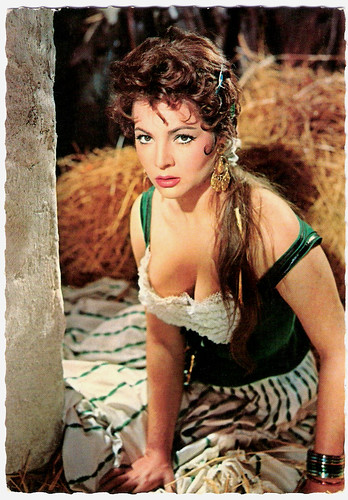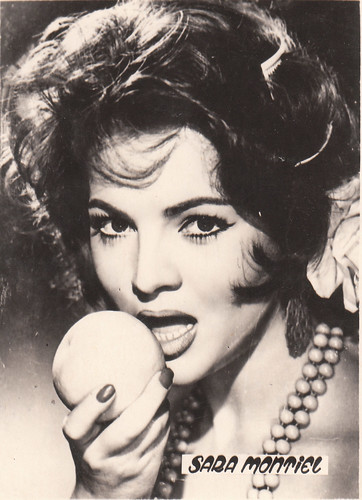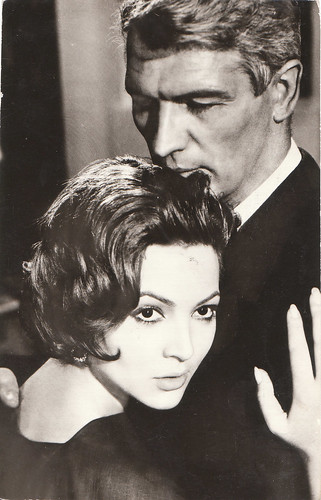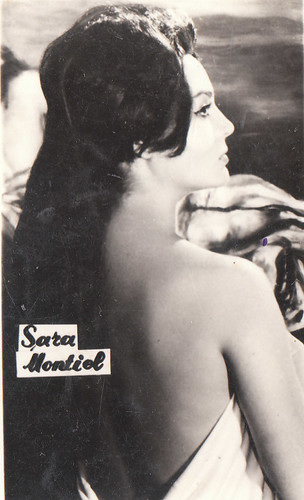Spanish singer and actress Sara Montiel died today. She was 85. Sara, also known as Sarita and Saritísima, was a much-loved and internationally known name in the Spanish-speaking cinema. In the late 1950’s, Montiel achieved the status of mega-star in Europe and Latin America with El Último Cuple/The Last Torch Song (1957). This film and La Violetera/The Violet Peddler (1958) netted the highest gross revenues ever recorded for films made in the Spanish speaking film industry. Montiel was also the first woman to distill sex openly in Spanish cinema at a time when even a low cut dress was not acceptable.

Spanish collector's card by Cifesa.

French postcard by E.D.U.G., no. 54. Photo: publicity still for Carmen de la Ronda/The Devil Made a Woman (1959, Tulio Demicheli).
Enormous Potential
Sara Montiel was born as María Antonia Alejandra Vicenta Elpidia Isidora Abad Fernández in the village of Campo de Criptana in the province of Ciudad Real, Spain, in 1928. Her parents were Isidoro Abad, a peasant who later operated a bar, and Maria Vicenta Fernández, a door-to-door beautician. At 15, Montiel won a beauty and talent contest held by Cifesa, the most influential film studio at that time in Spain. The next year, she made her film debut in Te Quiero Para Mí/I want you for myself (1943, Ladislao Vajda), credited as Maria Alejandra, a shortened version of her real name. In spite of the small part, the young actress caught the attention of producers and directors who realized her enormous potential. By the end of 1944 she was given the starring role in the film Empezó En Boda/It Started at the Wedding (1944, Raffaello Matarazzo) which introduced her with a new image and a new name: she was now a sophisticated blonde named Sara Montiel. In the next four years she appeared in 14 films. Soon her colleagues started calling her Sarita (Little Sara) due to her youth. The nickname caught on with the press and the public consequently, since then, both Sara and Sarita have been used in credits and publicity. In 1947, she played the role of Antonia, the niece of Don Quixote in Don Quijote de la Mancha/Don Quixote (1947, Rafael Gil), the Spanish film version of Cervantes' great novel. Her first international success was her role as an Islamic princess in Locura de Amor/The Mad Queen (1948, Juan de Orduña) with Fernando Rey. Locura de Amor led to a contract in Mexico where she established herself as one of the most popular film actors of the decade. She made a total of 13 films between 1950 and 1954. Due to her popularity in Mexico, Hollywood came calling, and she was introduced to American filmgoers in the Western Vera Cruz (1954, Robert Aldrich) co-starring with Gary Cooper and Burt Lancaster. She was offered the standard seven-year contract at Columbia Pictures, but she refused, afraid of Hollywood's typecasting policies for Hispanics. Instead she free-lanced at Warner Bros. in Serenade (1956, Anthony Mann) with Mario Lanza and Joan Fontaine, and at RKO in Run of the Arrow (1957, Samuel Fuller), opposite Rod Steiger and Charles Bronson. Director Anthony Mann became her first husband.

Spanish postcard by J.R.B.. Retail price: 2'50 Pesetas. Photo: Cifeso. Publicity still for El Ultimo Cuplé (1957).

Spanish card by Archivo Bermejo. Retail price: 2'50 Pesetas. Photo: Dipenfa. Publicity still for La violetera (1958) with Raf Vallone.
The Last Torch Song
Back in Europe, Sara Montiel became the most commercially successful Spanish actress during the mid-20th century. The film musical El Ultimo Cuplé/The Last Torch Song (1957, Juan de Orduña) was an unexpected success. It played for a year in the same theaters in which it opened. A similar reaction followed in the other European countries and in Latin America. El Ultimo Cuplé turned Montiel into an overnight sensation both as an actor and a singer. Then she achieved the status of mega-star with La Violetera/The Violet Peddler (1958, Luis César Amadori) with Raf Vallone. It broke the box-office records set by El Ultimo Cuplé. She won the Premio del Sindicato (at the time Spain's equivalent to the Oscar) for best actress two years in a row for her performances in El Último Cuplé and La Violetera. From then on she combined filming highly successful vehicles, recording songs in five languages and performing live all over the world. Among the films that continued her immense popularity were Carmen, la de Ronda/The Devil Made A Woman (1959, Tulio Demicheli) with Jorge Mistral, Mi Ultimo Tango/My Last Tango (1960, Luis César Amadori), and Pecado de Amor/Sin of Love (1961, Tulio Demicheli). By 1962 she had become a legend to millions worldwide reaching markets that had previously been ‘uncharted territory for the Spanish cinema. La Bella Lola (1962, Tulio Demicheli), a new version of Camille with Antonio Cifariello and Maurice Ronet, La Reina del Chantecler/The Queen of Chantecler (1963), and Noches de Casablanca/Nights of Casablanca (1963, Henri Decoin) with Maurice Ronet spread Sarita's popularity to Eastern Europe, Greece, Turkey, Israel and Japan. Samba (1964, Rafael Gil) with Italian actor Fosco Giachetti, La mujer perdida/The Lost Woman (1966, Tulio Demicheli) with Massimo Serato, Tuset Street (1967, Jorge Grau, Luis Marquina) with Patrick Bauchau, and Esa Mujer/That Woman (1969, Mario Camus) followed. In 1973, her film Varietés (1971, Juan Antonio Bardem) was banned in Beijing. By then she had become a legend to her millions of fans but became dissatisfied with the film industry when producers started offering her roles in soft core porno films.

Scan. Collection: Véronique3.

Postcard by Casa Filmului Acin, no. 534. C.P.C.S. With Raphael Alonzo. Collection: Véronique3.

Scan. Collection: Véronique3.
Bad Education
Sara Montiel has been married four times: to American film director Anthony Mann (1957-1963), industrial attorney José Vicente Ramírez Olalla (1964-1978), attorney-journalist José Tous Barberán (1979-1992), and Cuban videotape operator Antonio Hernández (2002-2005). With José Tous Barberán, she adopted two children: Thais (1979) and Zeus (1982). Before, during and after these marriages she had countless affairs. During the Franco dictatorship, Spanish stars were forbidden to behave in any way that could be perceived at odds with Christian principles and morality, consequently they kept their private lives very private. Montiel was no exception. Pre-marital or out of wedlock relationships were never mentioned and her civil marriage to Anthony Mann was underplayed along with the divorce. After starring in the film Cinco Almohadas Para Una Noche/ Five pillows for a night (1974, Pedro Lazaga), Montiel announced her retirement from the cinema. For a long time she concentrated on stage musicals which were highly successful: Sara en Persona (1970-1973), Saritísima (1974-1975), Increible Sara (1977-1978), Super Sara Show (1979-1980), Doña Sara de La Mancha (1981-1982), Taxi Vamos Al Victoria (1983-1984), Nostalgia (1984-1985), Sara, Mes Que Mai !! (1986), Sara, Siempre Sara (1987-1988) and Saritízate (1989-1990). In the 1990’s, Montiel surprised everyone by branching out into television: Sara y Punto (1990), a mini-series of seven one-hour episodes, included a serialized biography of the star, many popular guests including Luciano Pavarotti and Charles Aznavour, and Montiel singing her greatest hits in addition to new songs written especially for her. Next came Ven al Paralelo/Come to Paralelo (1992), taped in a Barcelona theater where Montiel hosted, sang and acted in comedy sketches in front of a live audience. In 2000, she published her autobiography Vivir es un placer (Memories: To Live Is A Pleasure), an instant bestseller with ten editions to date. A sequel Sara and Sex followed in 2003. In these books Montiel revealed other relationships in her past including one-night stands with writer Ernest Hemingway as well as actor James Dean. She also claimed a long term affair in the 1940’s with playwright Miguel Mihura and mentioned that science wizard Severo Ochoa, a Nobel Prize winner, was the true love of her life. Currently she remains one of the highest paid celebrities in Spain's TV talk and reality shows. She was portrayed in the Pedro Almodóvar film La mala educación/Bad Education (2004) by Gael García Bernal as the transsexual character Zahara, and a clip from one of her films was used as well. In 2009, the pop group Fangoria invited Montiel to record a track for the re-release of the band's album Absolutamente. The title track Absolutamente became a Top 10 hit. After almost 40 years without making a film, she accepted a role in the comedy Abrázame/Hold (2011, Óscar Parra de Carrizosa). The film was shot on location in Montiel's birth place in La Mancha. According to the star, in this film she dared to do "a parody of her old screen image, just for fun." Sara Montiel died today at home. She is survived by her children Thais and Zeus.
Trailer for El Ultimo Cuplé/The Last Torch Song (1957). Source: Soryeye (YouTube).
Trailer for Pecado de Amor/Sin of Love (1961). Source: Callecolon (YouTube).
Sara Montiel sings La paloma in La Bella Lola (1962). Source: Egor Savin (YouTube).
Sara Montiel sings Quizàs, Quizàs, Quizàs. Source: AlexandreN57 (YouTube).
Sources: InfoMontiel, Raremar (IMDb), Wikipedia, and IMDb.

Spanish collector's card by Cifesa.

French postcard by E.D.U.G., no. 54. Photo: publicity still for Carmen de la Ronda/The Devil Made a Woman (1959, Tulio Demicheli).
Enormous Potential
Sara Montiel was born as María Antonia Alejandra Vicenta Elpidia Isidora Abad Fernández in the village of Campo de Criptana in the province of Ciudad Real, Spain, in 1928. Her parents were Isidoro Abad, a peasant who later operated a bar, and Maria Vicenta Fernández, a door-to-door beautician. At 15, Montiel won a beauty and talent contest held by Cifesa, the most influential film studio at that time in Spain. The next year, she made her film debut in Te Quiero Para Mí/I want you for myself (1943, Ladislao Vajda), credited as Maria Alejandra, a shortened version of her real name. In spite of the small part, the young actress caught the attention of producers and directors who realized her enormous potential. By the end of 1944 she was given the starring role in the film Empezó En Boda/It Started at the Wedding (1944, Raffaello Matarazzo) which introduced her with a new image and a new name: she was now a sophisticated blonde named Sara Montiel. In the next four years she appeared in 14 films. Soon her colleagues started calling her Sarita (Little Sara) due to her youth. The nickname caught on with the press and the public consequently, since then, both Sara and Sarita have been used in credits and publicity. In 1947, she played the role of Antonia, the niece of Don Quixote in Don Quijote de la Mancha/Don Quixote (1947, Rafael Gil), the Spanish film version of Cervantes' great novel. Her first international success was her role as an Islamic princess in Locura de Amor/The Mad Queen (1948, Juan de Orduña) with Fernando Rey. Locura de Amor led to a contract in Mexico where she established herself as one of the most popular film actors of the decade. She made a total of 13 films between 1950 and 1954. Due to her popularity in Mexico, Hollywood came calling, and she was introduced to American filmgoers in the Western Vera Cruz (1954, Robert Aldrich) co-starring with Gary Cooper and Burt Lancaster. She was offered the standard seven-year contract at Columbia Pictures, but she refused, afraid of Hollywood's typecasting policies for Hispanics. Instead she free-lanced at Warner Bros. in Serenade (1956, Anthony Mann) with Mario Lanza and Joan Fontaine, and at RKO in Run of the Arrow (1957, Samuel Fuller), opposite Rod Steiger and Charles Bronson. Director Anthony Mann became her first husband.

Spanish postcard by J.R.B.. Retail price: 2'50 Pesetas. Photo: Cifeso. Publicity still for El Ultimo Cuplé (1957).

Spanish card by Archivo Bermejo. Retail price: 2'50 Pesetas. Photo: Dipenfa. Publicity still for La violetera (1958) with Raf Vallone.
The Last Torch Song
Back in Europe, Sara Montiel became the most commercially successful Spanish actress during the mid-20th century. The film musical El Ultimo Cuplé/The Last Torch Song (1957, Juan de Orduña) was an unexpected success. It played for a year in the same theaters in which it opened. A similar reaction followed in the other European countries and in Latin America. El Ultimo Cuplé turned Montiel into an overnight sensation both as an actor and a singer. Then she achieved the status of mega-star with La Violetera/The Violet Peddler (1958, Luis César Amadori) with Raf Vallone. It broke the box-office records set by El Ultimo Cuplé. She won the Premio del Sindicato (at the time Spain's equivalent to the Oscar) for best actress two years in a row for her performances in El Último Cuplé and La Violetera. From then on she combined filming highly successful vehicles, recording songs in five languages and performing live all over the world. Among the films that continued her immense popularity were Carmen, la de Ronda/The Devil Made A Woman (1959, Tulio Demicheli) with Jorge Mistral, Mi Ultimo Tango/My Last Tango (1960, Luis César Amadori), and Pecado de Amor/Sin of Love (1961, Tulio Demicheli). By 1962 she had become a legend to millions worldwide reaching markets that had previously been ‘uncharted territory for the Spanish cinema. La Bella Lola (1962, Tulio Demicheli), a new version of Camille with Antonio Cifariello and Maurice Ronet, La Reina del Chantecler/The Queen of Chantecler (1963), and Noches de Casablanca/Nights of Casablanca (1963, Henri Decoin) with Maurice Ronet spread Sarita's popularity to Eastern Europe, Greece, Turkey, Israel and Japan. Samba (1964, Rafael Gil) with Italian actor Fosco Giachetti, La mujer perdida/The Lost Woman (1966, Tulio Demicheli) with Massimo Serato, Tuset Street (1967, Jorge Grau, Luis Marquina) with Patrick Bauchau, and Esa Mujer/That Woman (1969, Mario Camus) followed. In 1973, her film Varietés (1971, Juan Antonio Bardem) was banned in Beijing. By then she had become a legend to her millions of fans but became dissatisfied with the film industry when producers started offering her roles in soft core porno films.

Scan. Collection: Véronique3.

Postcard by Casa Filmului Acin, no. 534. C.P.C.S. With Raphael Alonzo. Collection: Véronique3.

Scan. Collection: Véronique3.
Bad Education
Sara Montiel has been married four times: to American film director Anthony Mann (1957-1963), industrial attorney José Vicente Ramírez Olalla (1964-1978), attorney-journalist José Tous Barberán (1979-1992), and Cuban videotape operator Antonio Hernández (2002-2005). With José Tous Barberán, she adopted two children: Thais (1979) and Zeus (1982). Before, during and after these marriages she had countless affairs. During the Franco dictatorship, Spanish stars were forbidden to behave in any way that could be perceived at odds with Christian principles and morality, consequently they kept their private lives very private. Montiel was no exception. Pre-marital or out of wedlock relationships were never mentioned and her civil marriage to Anthony Mann was underplayed along with the divorce. After starring in the film Cinco Almohadas Para Una Noche/ Five pillows for a night (1974, Pedro Lazaga), Montiel announced her retirement from the cinema. For a long time she concentrated on stage musicals which were highly successful: Sara en Persona (1970-1973), Saritísima (1974-1975), Increible Sara (1977-1978), Super Sara Show (1979-1980), Doña Sara de La Mancha (1981-1982), Taxi Vamos Al Victoria (1983-1984), Nostalgia (1984-1985), Sara, Mes Que Mai !! (1986), Sara, Siempre Sara (1987-1988) and Saritízate (1989-1990). In the 1990’s, Montiel surprised everyone by branching out into television: Sara y Punto (1990), a mini-series of seven one-hour episodes, included a serialized biography of the star, many popular guests including Luciano Pavarotti and Charles Aznavour, and Montiel singing her greatest hits in addition to new songs written especially for her. Next came Ven al Paralelo/Come to Paralelo (1992), taped in a Barcelona theater where Montiel hosted, sang and acted in comedy sketches in front of a live audience. In 2000, she published her autobiography Vivir es un placer (Memories: To Live Is A Pleasure), an instant bestseller with ten editions to date. A sequel Sara and Sex followed in 2003. In these books Montiel revealed other relationships in her past including one-night stands with writer Ernest Hemingway as well as actor James Dean. She also claimed a long term affair in the 1940’s with playwright Miguel Mihura and mentioned that science wizard Severo Ochoa, a Nobel Prize winner, was the true love of her life. Currently she remains one of the highest paid celebrities in Spain's TV talk and reality shows. She was portrayed in the Pedro Almodóvar film La mala educación/Bad Education (2004) by Gael García Bernal as the transsexual character Zahara, and a clip from one of her films was used as well. In 2009, the pop group Fangoria invited Montiel to record a track for the re-release of the band's album Absolutamente. The title track Absolutamente became a Top 10 hit. After almost 40 years without making a film, she accepted a role in the comedy Abrázame/Hold (2011, Óscar Parra de Carrizosa). The film was shot on location in Montiel's birth place in La Mancha. According to the star, in this film she dared to do "a parody of her old screen image, just for fun." Sara Montiel died today at home. She is survived by her children Thais and Zeus.
Trailer for El Ultimo Cuplé/The Last Torch Song (1957). Source: Soryeye (YouTube).
Trailer for Pecado de Amor/Sin of Love (1961). Source: Callecolon (YouTube).
Sara Montiel sings La paloma in La Bella Lola (1962). Source: Egor Savin (YouTube).
Sara Montiel sings Quizàs, Quizàs, Quizàs. Source: AlexandreN57 (YouTube).
Sources: InfoMontiel, Raremar (IMDb), Wikipedia, and IMDb.
1 comment:
Such a beauty, I will have to seek out her work.
Post a Comment